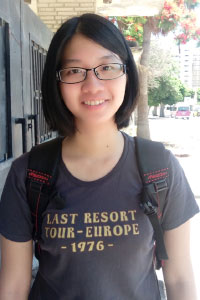A Search for Answers in ‘The OA’
By joining human nature with elements of science fiction, the series forces viewers to question their own realities.
By Jessie Yang, University of Hong Kong
Near the turn of the year, “The OA” surprised audiences with its captivating charisma, and left viewers with a mixed experience of shock, suspicion and surrealism, which reflects society’s fear and uncertainty of unresting economic and political turmoil.
The sci-fi drama follows the narrative of Prairie (Brit Marling), a blind girl who went missing seven years ago but returned with her eyesight restored. As she begins to unveil her horrifying past, others around her also embark on a search for truth and identity. As a result, “The OA” accomplishes the dual task of exploring science and the afterlife, but also gently touches upon questions of humanity, such as what is life and what is your purpose in it?
The Hidden Messages
Apart from discussion of science and the uncanny experience of NDE (near death experience), the core of the series focuses on social issues, and how storytelling has the power to change lives.
Prairie begins her story with four teenagers and one teacher in a local high school, each of who has their own mental scars or predicaments to face every day. Somehow, Prairie’s own experience in the years she was missing directs them to a better path and changes their lives forever. Throughout the storyline, “The OA” begins to develop different twists and shows how the protagonists deal with death, loss and crumbling families in an imperfect world. Instead of addressing those issues individually, the series subtly combines the elements of loss, which offers an intriguing perspective for discussion.
“The OA” poses the question of what can reasonably be expected of trauma survivors. Prairie is reluctant to talk about her experience, which is seemingly unbelievable to her parents, counselor and the media. “When I say it out loud, it all falls apart,” she says to her mother. When trauma victims discuss their stories, it is impossible for them to talk about the painful experience without facing scrutiny from others. For instance, Prairie’s parents want to hear whether she is tortured or raped, so that they can experience the catharsis of their guilt. The counselor wants to gather all the information he can to pursue the criminal, while the media wants to focus on glorifying Prairie’s experience as a story with hope and inspiration.
Although Prairie is disclosing her thoughts to the teenagers, in a sense they are searching for guidance from her. Still, no one asks what she wants, nor are they willing to approach her without their own preconceptions. Near the end of the series, when her parents are pushed by the media to a breaking point, Prairie begins to tell them about the years she was missing, a story with neither mystery nor supernatural elements, but instead a more comprehensible version.

“The OA” shows audiences just how interconnected everyone is, and the extent to which personal decisions can influence the lives of others. The result is an affirmation of one of life’s oldest truisms, that the most terrifying questions are the ones that expose our beliefs to be false.
The Power of Storytelling
As evidenced by actress and director Brit Marling’s previous films, it is clear that she aims to challenge audiences’ perceptions by bringing surreal elements into ordinary lives. The storytelling in “The OA” originates in previous works by Marling that explore the realm of the unknown. Her collaboration with “The OA” director Zal Batmanglij can be traced back to “Sound of My Voice,” which centers on a cult that worships a woman who claims to be from the future, and leaves the audience without definitive answers; whether she is lying or not depends on the viewer’s interpretation. Another film Marling stars in, “Another Earth,” is a sci-fi drama that questions whether parallel universes can offer redemption to individuals, a theme that is echoed in “The OA.” Even the topic of the afterlife, which is an important element in the hit Netflix series, can be found in “I Origins,” a film Marling also acts in, about resurrection and continuation of human lives.
The fragility of human nature, and the fear of uncontrollable emotion in the face of tragedy, are what lend power to the narrative in Marling’s films.
The confusing perspectives highlight people’s ability to thrive in a hostile environment, and testify to Marling’s belief in humanity to persevere.
Storytelling is the most compelling element in “The OA,” as it enhances the plot by alluding to events both in and out of the show’s reality. In the series, science fiction is the backbone of the narration, but the human foibles of the characters makes their emotions relatable. The eight-episode drama serves as a glimpse of what will become Prairie’s ongoing attempts to adjust to her life after captivity, and her storytelling acts as a kind of salvation to the people around her.
If one quote could encapsulate the embedded nihilism of the series, it would be Khatun’s: “To exist is to survive unfair choices.”
















